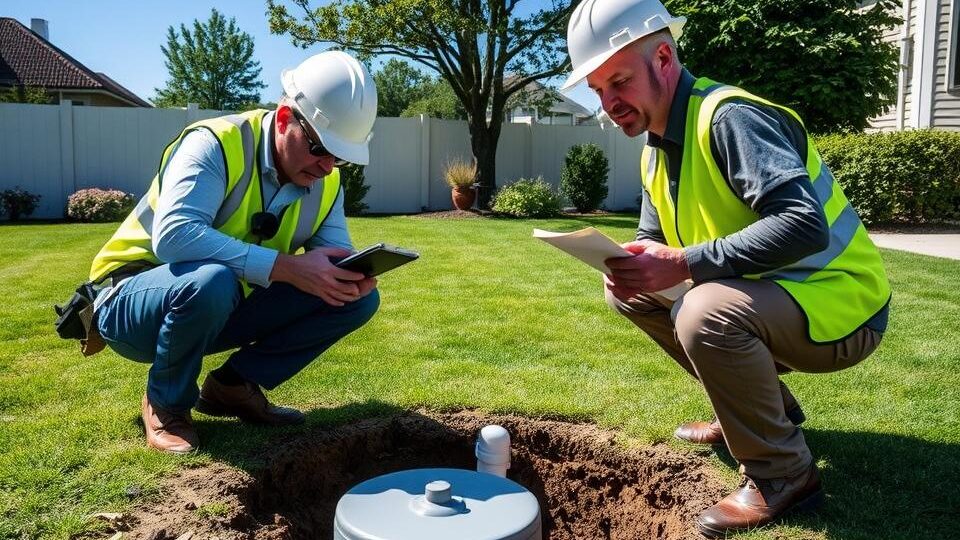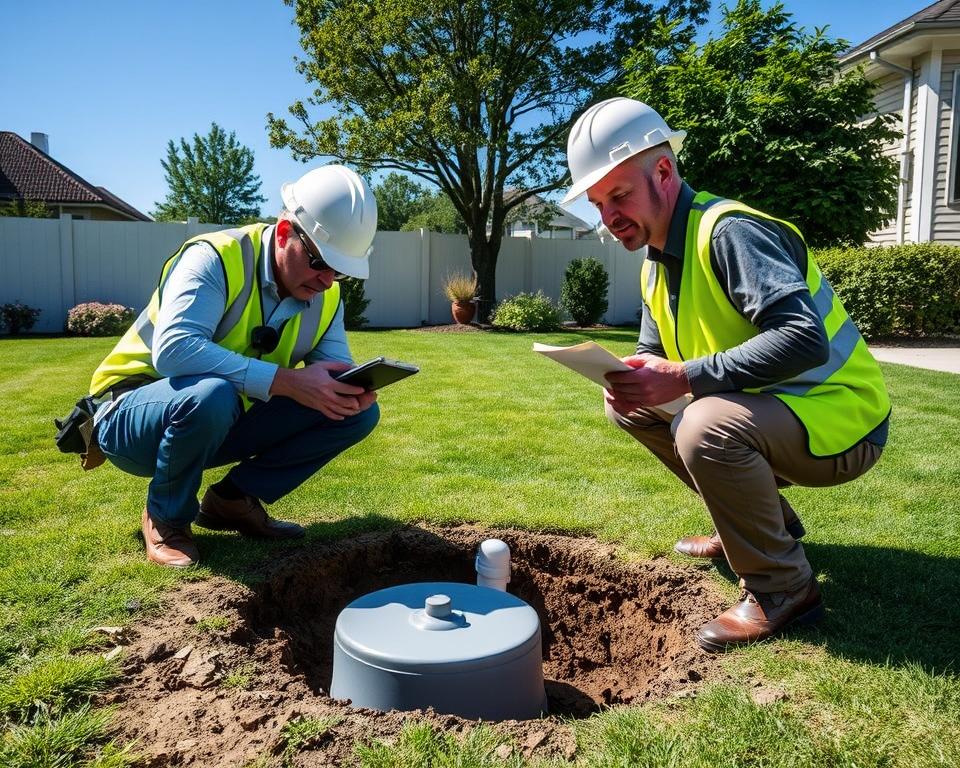
Troubleshooting Common Septic Air Pump Issues in Clovis
Vital Guidelines for Septic System Pumping
Ever pondered how often you should arrange septic system pumping to avert expensive malfunctions? With more than 20 percent of U.S. households relying on septic systems, comprehending their maintenance is crucial. Knowing precisely when to book a septic tank service is critical to its durability. In addition, homeowners have access to economical septic pumping options that provide top-notch functionality without overspending. Below, we outline crucial upkeep recommendations beneficial for every homeowner.
Principal Conclusions
- Scheduled septic system pumping is crucial for optimal operation.
- Spotting the indicators that signal the necessity for service can prevent major issues.
- Hiring qualified septic system pumpers guarantees quality maintenance.
- Budget-friendly septic pumping options are within reach for homeowners.
- Periodic inspections support maximum system performance.
Know How Your Septic System Works
A septic system serves a vital role in managing household wastewater, consisting of several important components that work in unison. The initial drain line conveys wastewater from your home to the septic tank, where the process begins. In the tank, an underground chamber, solids settle at the bottom, and bacteria digest these solids, cleaning the waste effectively.
The clarified liquid discharge next moves from the septic tank to the distribution box, where it is dispersed evenly across the drain field or leach field. Here, the soil extends the filtration, continuing to purify the wastewater. Understanding the functions of these septic system parts is essential. It empowers homeowners to oversee and care for their systems properly.
Being aware of how your septic system runs helps you implement preventive maintenance measures. It’s wise to have periodic appointments with qualified technicians of septic systems – septic pump out near me. They supply crucial insights for peak performance of your system. These specialists assist in scheduling the necessary pump-outs and checks. This proactive approach can significantly lengthen your septic system’s lifespan.
The Value of Septic System Care
Caring for your septic tank on a routine basis is critical for homeowners who aim for their system to last. A well-cared-for system provides peace of mind and secures your property’s value. Without proper care, you’re facing system breakdowns and health dangers.
Opting for a first-rate septic pumping service is crucial. They deliver timely inspections and pump-outs, removing sludge and scum buildup. If maintenance is neglected, urgent pumping may be required, which is costly.
Following a steady maintenance plan is prudent. It involves professional evaluations and regular pumping. This preventative measure helps avoid urgent issues, ensuring a more secure living environment for everyone.

Signs Your Septic System Needs Attention
Being alert to septic system issues can avoid costly repairs and major damage. Typical signs signal when your system needs a check. These comprise:
- Slow drains throughout the house
- Pooling water in the yard above the drain field
- Bad odors near the septic tank or leach field
- Remarkably lush grass growth in certain areas of your yard
These signs could point to problems that might result in your system failing. Prompt action is vital. Calling in septic pumping experts for an inspection helps. Prompt response prevents minor issues from growing into large ones. Moreover, routine upkeep guarantees your system works well and has a longer life.
Septic System Pumping: Best Practices
Timely pumping of your septic tank is imperative to sidestep hefty clogs and backups. It’s important to find the ideal interval for maintenance. Homeowners should typically plan pumping every 2 to 5 years, depending on the tank’s size and household wastewater levels. Heavy use of garbage disposals may require more frequent pumping.
Employing experienced pumpers ensures your tank gets a full clean and check-up. During pumping, specialists look for any issues, such as broken baffles. Finding these problems early prevents costlier expenses and inconveniences later. Routine pumping schedules and expert help secure your septic system’s efficient operation.
Routine Inspections for Optimal Performance
Regular inspections are essential for your septic system’s effectiveness. Septic system inspections highlight minor issues before they grow. Experts advise inspections every three to five years, depending on system size and household usage. This avoids pricey fixes.
Maintaining maintenance records is important for tracking your system’s condition. These records offer insights into previous inspections, repairs, and the right time to schedule septic tank cleaning services. With this information, planning for future upkeep becomes easier, keeping septic systems in excellent shape.
Frequent inspections and detailed record-keeping not only improve system efficiency but also lengthen its life. This method protects the environment and the investment in a safe, operational home.
| Inspection Type | Recommendation Frequency | Benefits |
|---|---|---|
| Visual Inspection | Annually | Identify surface issues |
| Professional Inspection | Every 3–5 years | Assess functionality and detect problems |
| Septic Tank Pumping | Every 3–6 years | Prevent overflow and system failure |
Efficient Water Usage to Extend Septic Life
Mindful water use is essential for keeping your septic system robust. It not only aids the environment but also improves the performance of your home’s plumbing. By adopting straightforward, yet effective, conservation methods, homeowners can cut down on wastewater.
Space out your laundry activities over the week instead of completing them in a single day. This enables the septic system to handle water better and avoids tank overflow. Choosing low-flow fixtures in your kitchens and bathrooms yields considerable water savings, retaining the water pressure up while cutting the flow rate, thus lowering the amount of wastewater produced each day.
Quickly fixing leaks is another way to help your septic system. Even a small leak can result in a large waste of water, stressing the septic system. Through periodic inspections and repairs, you greatly aid the system’s efficiency.
Emphasizing water conservation isn’t just good for your septic system; it’s also a step towards eco-friendly living. Integrating such practices a part of your lifestyle benefits both your household and the planet.
Best Practices for Household Waste Disposal
Homeowners play a vital role in preserving their septic system’s health by managing household waste correctly. It’s important to avoid disposing of non-biodegradable items like wipes, plastics, and other harmful products in the system. These items can cause clogs, leading to costly repairs and a reduction in efficiency.
Composting food scraps and organic materials is a advantageous alternative to sending them to landfill. This practice markedly reduces the amount of solid waste entering the septic tank. Focusing on biodegradable waste disposal helps maintain the ecological balance needed for effective waste management.
It’s essential to monitor what goes down the drains. Non-decomposable items can necessitate more frequent septic tank pumping. By understanding and adhering to correct waste disposal methods, you can secure a more efficient and long-lasting septic system.
Choosing Septic-Friendly Cleaners
The health of your septic system depends significantly on your choice of cleaning products. Selecting septic-safe cleaning products is crucial. These products safeguard the balance of beneficial bacteria that break down waste. Many standard cleaners contain harmful chemicals that jeopardize this balance, leading to costly repairs or system failure.
Homeowners should try natural alternatives that are both powerful and environmentally friendly. Common household items like baking soda, vinegar, and lemon juice are superb choices. These natural cleaners are not only good at cleaning but also encourage your septic system’s health.
Avoiding products that contain antibacterial agents and chlorine bleach is important. Such substances harm the helpful good bacteria, weakening your system’s functionality. By adopting sustainable products, you ensure both the efficiency and longevity of your septic system.
The Role of Bacteria in Your Septic System
Bacteria perform a key role in keeping your septic system healthy. They decompose solids naturally and boost nutrient processing. A lack of healthy bacteria can lead to system failure, bringing about costly repairs.
Homeowners can bolster their system by using organic additives. These products boost beneficial bacteria, making waste decomposition more effective. It’s important to select organic additives that are helpful, not harmful, to the septic environment.
A healthy bacterial community is crucial to a septic system’s longevity and efficiency. It avoids solid buildup and lessens the need for repeated pumping. Prioritizing bacterial health makes waste management more effective and eco-friendly.
As a Final Point
Septic system care is vital for the durability and functionality of your home’s wastewater system. Adhering to critical maintenance tips sidesteps costly repairs. Knowing routine pumping and inspections is paramount. This secures your septic system stays in top condition.
Educating yourself on your septic system’s operation and smart approaches in water and waste management is crucial. Engaging professionals like All in Sanitation provides expertise. This supports your septic system’s long-term health and offers reassurance.
Putting effort into proper septic maintenance today brings future benefits. It protects your home and improves your family’s quality of life. Prioritizing septic system care gives certainty with a well-maintained system.